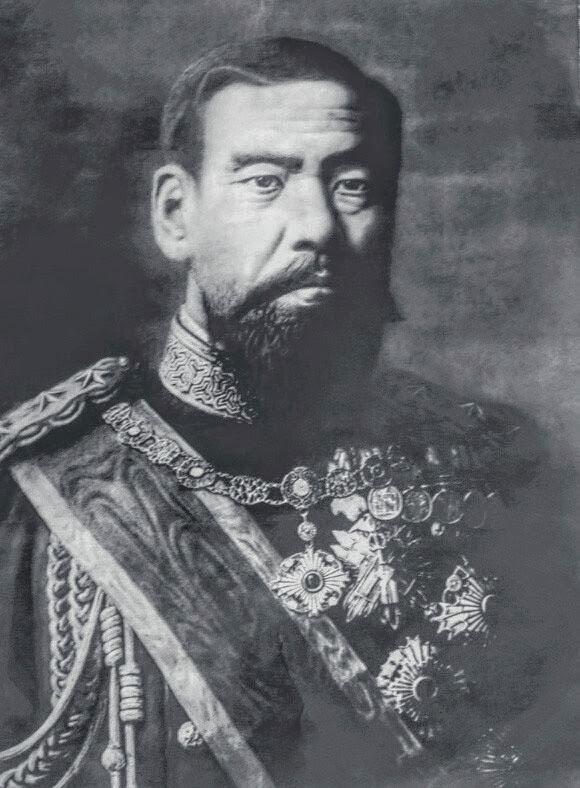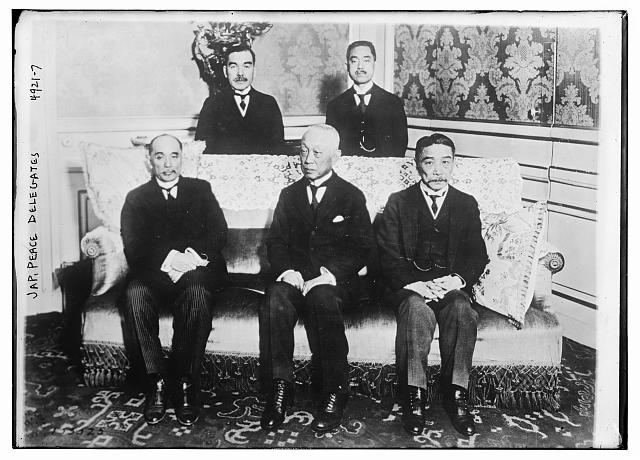" When the Meiji emperor was restored as head of Japan in 1868, the nation was a militarily weak country, was primarily agricultural, and had little technological development " - Asia For Educators, Columbia University [2009]
Tokugawa's Fall
The Tokugawa's fall and Emperor's restoration to power formed the climax of political turmoil in Japan burst by Perry's intrusion. The Emperor became a unifying force in the shogunate's weakest time.
"The shogunate was in turmoil even before Perry's arrival in 1853 and 54 -- the Dutch, for instance, had informed the Japanese of the Opium War in China and that 'times were changing' and that Japan could no longer afford to remain secluded from the world. Unrelated to Perry, as well, there were agitators who were arguing for the restoration of the emperor, perhaps in tandem with shogunal rule" - Professor Emi Foulk Bushelle, Western Washington University, Student Conducted Email Interview [2020]

Meiji Emperor
Unknown artist [n.d.]
Wikipedia
Rebellions through the 1860's resulted in the Tokugawa's overthrow. Power transferred to Emperor Komei's son Mutsuhito, the Meiji Emperor.
Effects of the Meiji Restoration
The Meiji Restoration was a turning point for Japan. Those advocating for the expulsion of foreigners realized that the West's might was too great, as evidenced by Perry. To establish itself as a power, Japan had to strengthen its military and engage in commerce.
"In just three decades, from the 1860s to the 1890s, the Japanese economy emerged as an Asian powerhouse...[Japan] began competing successfully with British firms in China and India, as well. Japanese shippers were competing with European traders to carry these goods even to Europe" - Andrew Gordon, author of A Modern History of Japan [2003]
"When the Meiji period ended, with the death of the emperor in 1912, Japan had
· a highly centralized, bureaucratic government;
· a constitution establishing an elected parliament;
· a well-developed transport and communication system;
· a highly educated population free of feudal class restrictions;
· an established and rapidly growing industrial sector based on the latest technology; and
· a powerful army and navy" - Asia for Educators [2009]
Japan adopted many Western ideas, the most important being of government and military. The Meiji Constitution, which was used until 1947, united Japanese law through bureacracy in regions that were previously autonomous daimyos. Decisive victories over China and Russia in 1889 and 1905 established Japan as a naval powerhouse, earning Japan recognition as a "Big Five" Power in the Versailles Peace conference concluding WWI.

Japanese Delegation at the Versailles Peace Conference
Unkown artist [1919]
Library of Congress Prints and Photographs Collection
________________________________________________________________________________________________________________________________________________________________
The Tokugawa barrier broken, Japan launched itself into international relations as a world power with the Meiji Restoration's modernization. Though Perry was integral to this, he left a sour taste in Japanese minds.
________________________________________________________________________________________________________________________________________________________________